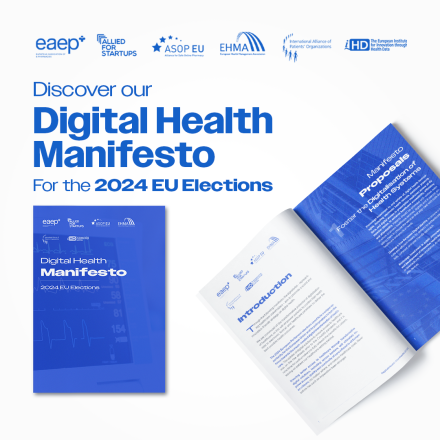This website uses cookies so that we can provide you with the best user experience possible. Cookie information is stored in your browser and performs functions such as recognising you when you return to our website and helping our team to understand which sections of the website you find most interesting and useful.
The future of European health systems
17 July 2017
Prompted by the White Paper on the Future of Europe released by the European Commission and other emerging issues related to healthcare, the future of health systems has become an increasingly hot topic. A growing aging population in Europe, coupled with health budget cuts, has made it evident that new measures to address these challenges must be discussed and developed. EHMA has been actively engaged with the topic as shown by the theme of the recently concluded EHMA 2017 Annual Conference on ‘Health Futures’ and the ongoing TO-REACH project [1] that aims to establish the foundation of a joint European research programme on health services and systems.
To gather further updates on the future of European health systems, the EHMA Secretariat attended a debate on 27 June, 2017, hosted by the Interest Group on Access to Healthcare and chaired by MEPs Andrey Kovatchev, Cristian Bușoi, Karin Kadenbach, Lieve Wierinck and PACT Secretary General Stanimir Hasardzhiev. This debate was entitled ‘Future Scenarios for the EU: What role for Healthcare?’ and included speakers, Robert Madelin, former Director General of DG Santé, Andrzej Rys, current director of DG Santé, Justina Januševičienė from the Lithuanian Ministry of Health and Yann Le Cam of EURORDIS.

The value of health and social security
The value of health and the conclusion that economic growth can only be achieved with healthy populations serves as the established reason as to why health systems remain important in discussions concerning the future of Europe. Due to this, growing health threats that may significantly impact the health of European citizens such as Antimicrobial Resistance (AMR) and challenges associated with aging populations remain a priority for policy makers and regulatory bodies to properly respond to. Member States, with support from the Commission, are in the process of developing national health systems that are to be sustainable and resilient in times that are constantly changing and unpredictable.
The health sector is a vital component of the economy representing 10% of the EU’s GDP and accounts for 8% of its total workforce [i]. This noteworthy statistic shows how health is not only an important social aspect but is heavily intertwined with the economy.

Figure 1: Health expenditure as a share of GDP, 2015 (or nearest year)
Source: OECD Health Statistics 2016; Eurostat Database; WHO, Global Health Expenditure Database
Just as statistics such as these show the impact health has on various socio-economic areas, there is a greater call for value-based systems and outcomes based measurements that would highlight progress, or the lack of it, in health systems. These measurements that would quantify the effectiveness of new policies and regulations implemented would lead to evidence-based evaluations and conclusions. Data gathered would then be considered into The Bermuda Triangle of Policy that is composed of scientific evidence, political judgment and value preference to further influence future projects and proposed plans.
Collaboration across borders
The health system dilemma is constantly discussed with the role of stakeholders in mind. However, to fully reform health systems to adapt to new challenges, these stakeholders should instead be viewed in light of the community as a whole. There is enhanced value if outcomes can be measured and patient reports that detail the effectiveness of new policies can be analysed to identify good and bad practices. Actions designed to assess the performances of various health systems would not only allow improvements to be objectively measured, but potentially could be used to benchmark hospitals regionally, nationally and across Europe.
For Europe to become a best practice region on specific health issues, there is a need for collaboration and an exchange of knowledge to occur on national levels. The European region cannot be identified as a best practice region if some Member States are implementing policies that are effective while others are falling behind due to a lack of resources or support. Methodologies for the collection of data to ensure detailed reports that are complete and comparable across different regions are necessary if exchange and implementation of best practices across borders is to occur. As with the collection and exchange of data, protection of individual personal information is always a concern and this issue must be addressed if plans are to continue in this direction. Despite all the challenges in the way of collaboration across borders, however, it is evident that there is something to be learned when some countries spend more on health with poorer outcomes while others spend less on health with better outcomes.
The future of health systems is a topic that will continue to be discussed during times when new challenges continue to arise and actualisation of solutions become more complex. The goal of ensuring quality healthcare to European citizens across borders is a noteworthy direction to move towards; however, specific policies and guidelines are necessary to overcome broad barriers to establish best practices across regions. Unfortunately, there is no one sole solution to ensure the preparedness of health systems to address issues such as AMR and the prevalence of chronic diseases. Moving forward, it will be necessary to maintain engagement with the material by following national action plans, exchanging knowledge on best practices through networks and contributing to the discussion on the future of health systems. Believing in the importance of innovation and research evidence to identify effective and sustainable ways to restructure current health systems to tackle these challenges, EHMA maintains engagement through the To-reach project, which can be further explored here.
Learn more?
Included is a collection of further reading to supplement the contents of this article. Find below links to current projects and initiatives by the European Commission, a detailed report on the state of Health in Europe developed by the Organisation for Economic Co-operation and Development (OECD) and information on national health systems collected by the European Observatory on Health Systems and Policies.
- Health Systems Performance Assessment by the European Commission: https://ec.europa.eu/health/systems_performance_assessment/policy_en
- European Reference Networks: https://ec.europa.eu/health/ern/policy_en
- State of Health in the EU: Pooling Expertise, Strengthening Knowledge: http://ec.europa.eu/health//sites/health/files/state/docs/2016_factsheet_en.pdf
- 2016 Health at a Glance: Europe Report developed by the Organisation for Economic Co-operation and Development (OECD) with support from the European Commission: https://ec.europa.eu/health/sites/health/files/state/docs/health_glance_2016_rep_en.pdf
- The Health Systems and Policy Monitor by the European Observatory on Health Systems and Policies: http://www.hspm.org/mainpage.aspx
This blog was written by Sachi Inoue
Sources
[i] https://www.oecd.org/els/health-systems/Health-at-a-Glance-Europe-2016- CHARTSET.pdf
[1] TO-REACH – Transfer of Organisational innovations for Resilient, Effective, equitable, Accessible, sustainable and Comprehensive Health Services and Systems. (Grant Agreement 733274). Website: www.to-reach.eu
Recent News

ENVI Committee voting on the EU Pharmaceutical Strategy

Appointment of new Interim Executive Director

Our Digital Health Manifesto for the European elections 2024
What our Members say
I have been active in EHMA since the first years of the '90s and I have seen its evolution from a small association of members interested in sharing knowledge on health management practices to the current status of reference and advisory key player for EU, health systems and organisations, stakeholders associations, industry and universities. EHMA is now a unique knowledge hub, policy advisor, community of practice and network of best in class organisations involved in health policy and management. A place where health managers can build their competences, policy-makers and stakeholder associations envision how to implement and sustain change through health management, industry leaders understand how to engage more effectively with health organisations and systems. The right place to nurture and grow health management capabilities and capacity for every stakeholder of health systems.
Prof. Federico Lega, University of Milan, Italy
Health management has a crucial function in shaping public health and health system challenges. The Medical University of Varna, Bulgaria had success in collaborating with EHMA on EU-funded projects that has resourced us to create new health management competencies for the future workforce. In addition to all classical definitions, health management is a science dealing with individuals, groups, and society at large. It is an art contributing to the beauty of our lives and an interactive communication process at all levels of institutions and human energy. I have also had the pleasure to chair the South Eastern European Special Interest Group which gives members a space to discuss and tools to address how health systems are managed in our regions.
Prof. Todorka Kostadinova, Medical University of Varna, Bulgaria
I enjoy the high level of interaction and engagement in EHMA’s activities, in particular during the annual conference where the panel discussions are rich and well prepared. As a hospital manager and professor of health management, EHMA motivates and inspires me to be creative. You go back home feeling energised from seeing old friends and making new connections, as well as being convinced of serving as EHMA’s ambassador. It’s a strong feeling of interdisciplinary engagement, but it also feels like being part of family-like community.
Prof. Sandra C. Buttigieg, University of Malta, Malta
EHMA is a pre-eminent organisation for everyone working in planning, managing and delivering health services across Europe. As a long standing member of EHMA I have always been impressed by the vibrant community of managers, researchers and academics it has created and by the many opportunities for sharing knowledge and funding opportunities it has brought to its members. Its international scope is impressive and its impact is often felt in management and research across European and national health systems.
Prof. Axel Kaehne, Edge Hill University, UK
Health workforce has become more essential in operating, managing and maintaining health systems lately, particularly in crisis and emergency situations. European healthcare professions and the workforce need to be high on the agenda of managers and decision makers. The Health Services Management Training Centre, Semmelweis University in Hungary is a longstanding EHMA member, because it connects us with collaborators and experts, with whom we can have complex debates, from whom we can learn and at the end find solutions in various challenging fields of healthcare management.
Dr Eszter Kovács, Health Services Management Training Centre, Semmelweis University, Hungary
As a hospital administrator and health management professor, I see on a daily basis that the healthcare challenges require talented and skilled managers to transform it. the EHMA membership has been beneficial to bring healthcare management research and education to the demanding healthcare services world, promoting healthcare management competencies and knowledge creation.
Dr Alexandre Lourenco, APAH - Association of Portuguese Hospital Managers, Portugal
Many healthcare systems in Europe and beyond are facing similar challenges which require innovative and creative solutions. EHMA’s annual conference, webinars, Programme Directors’ group and other activities and resources provide incredible opportunities for networking, connecting and sharing experiences. A distinct feature of EHMA is the diversity of members with representation from many countries, sectors and different communities of practice – academic, policy-makers, practitioners, managers, leaders and students. The annual conference is a highlight in the calendar year, offering a friendly, fun and learningful environment for emerging and established members to engage, collaborate and meet up with old and new friends. I am proud to be a member of the EHMA Board.
Prof. Ann Mahon, University of Manchester, UK
Society evolution, pandemics and ageing modify health needs. So, health policies and services are to change dramatically. EHMA, through webinars, workshops and annual conference provides an excellent insight to a professional changing world, favouring closeness to management innovation and the protagonists of these changes. As a primary care services’ manager, participating in EHMA activities is really worth it and allows to involve oneself in the innovation processes.
Dr Antoni Peris Grao, Consorci Castelldefels Agents de Salut (CASAP), Spain